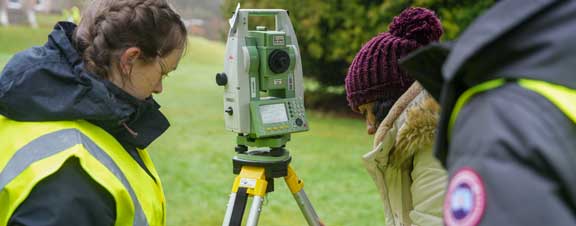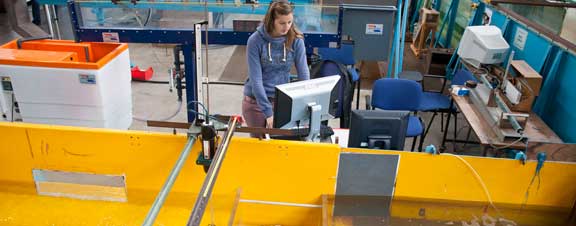Why study Civil Engineering?
Build the infrastructure of the future
From climate change to rapid urbanisation, the world urgently needs civil engineers to create sustainable, resilient infrastructure.
A degree in civil engineering will equip you to design and improve systems that support modern life, empowering you to make an impact on both local and global scales:
- Shape resilient cities and infrastructure for the future.
- Tackle real-world challenges in water, transport, climate, and more.
- Apply engineering to urgent environmental and social needs.
Why Cagla chose civil engineering
Cagla shares what inspired her to pursue civil engineering and explains that one of the benefits of this subject is its wide breadth that allows students to explore their interests and further specialise.
How you'll learn
Where expertise meets education
Our expert academics bring cutting-edge research and real-world experience into the classroom, ensuring you learn from those shaping the future of engineering. With a balanced mix of lectures, tutorials, labs, and workshops, our staff turn complex theory into practical insight, helping you thrive in both study and industry.

Learning spaces to drive innovation
Learn in our purpose-built spaces for innovation and creativity that are transforming the way our students study, research, and shape the world forever.

Peer support
Our Peer-Assisted Study Sessions (PASS) scheme is a fantastic resource for our students. Here, you’ll be matched with a mentor who runs weekly small-group sessions to support transitioning to higher education, developing a sense of belonging, academic success, and student health and wellbeing.

Beyond the classroom
Field courses offer you a unique opportunity to apply theoretical knowledge in real-world settings. By engaging in hands-on projects and site visits, you'll gain practical experience that enhances your understanding of civil engineering principles.
Study options
Integrated master's
The MEng year integrates engineering science with multi-faceted projects, allowing you to apply both technical and practical skills. Specialist units provide advanced knowledge, while inter-disciplinary projects offer real-world experience and the chance to gain specialised skills before launching your graduate career.

Industrial experience
Industrial experience allows you to spend a year working in industry as part of your degree. This is the perfect chance to apply your learning in a real-world setting, develop professional skills, and gain valuable insight into how the civil engineering sector operates, giving you a head start in your career.

Foundation year
Prepare for a degree course by first undertaking our Integrated Foundation Year. This is the perfect option for students who may not yet meet the typical entry requirements for direct entry to an undergraduate degree.

Civil with Enterprise
In every year of this programme, there are units delivered by the Manchester Business School, allowing you to develop a grounding in business, finance, and entrepreneurship alongside your sound engineering background.

Careers
Who do our graduates work for?
Needed after earthquakes, droughts, and times of war, our graduates make a positive impact on populations near and far. There is no telling where this qualification could take you!
Our civil engineering graduates go on to work for employers such as Arup, Atkins, AECOM, Buro Happold, Mott McDonald, Ferrovial, Network Rail, and more.
What do our graduates do?
The roles you can step into upon graduation include:
- Consulting structural engineer
- Design engineer
- Structural engineer
- Project manager
- Sustainability consultant
- Urban designer
- ... and so much more.
Our careers service
At Manchester, we don’t just teach you, we support you in planning your future from day one. Whether you're exploring career options, applying for internships, or preparing for graduate roles, you’ll have access to one-to-one support, advice, and workshops. equipping you with the confidence to succeed in a competitive job market.
Courses
Find the right course for you
There are options available to you if you want to study chemistry at Manchester.
How to apply
Start your journey to an undergraduate degree in civil engineering
If you’re interested in applying to the Civil Engineering degree at Manchester, here’s what you need to know.
Contact us
Have any questions? Get in touch
Department of Civil Engineering and Management Undergraduate Admissions
- Tel: +44 (0)161 275 8200
- Email: ug.mae.ce@manchester.ac.uk
